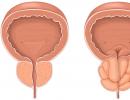The right diet for a mother who is breastfeeding her baby
From the moment of admission to the hospital with the onset of contractions and until the long-awaited discharge home, an average of 5 to 10 days will pass. All this time, the young mother will live according to the schedule and rules provided specifically in this maternity hospital. Of course, no less important during this period is the regime and variety of food during this period, to which the diet of a nursing mother will be subordinated.
Ideally, a woman after giving birth should follow the same diet as during pregnancy.
Why is a nursing mother's diet necessary?
- Mom's body needs some time to recover from pregnancy and childbirth.
- In order for your baby to develop well, be healthy and cheerful, mom's milk should contain a maximum of nutrients.
- In order to avoid allergies in the child, the food eaten by the mother must not contain potentially dangerous allergens.
Diet by month
While mom is in the hospital, her main diet is the food that is prepared there. Low-fat soups, boiled meat, cereals, dairy products - a balanced diet for a nursing mother. You can also ask relatives to bring you green apples, low-fat cottage cheese or yogurt, vegetable stew. Sweet, starchy and fatty foods should be discarded during this period! Such restrictions on food will help prevent constipation, which can lead to intoxication of the mother's body, and this, in turn, will harm the baby.
Diet tips for the first month after childbirth:
- You should have seasonal fruits and vegetables on your table.
- Try to eat fewer gas-producing foods (cabbage, legumes, rye bread, pastries, spices, grapes, radishes, bell peppers, corn, cucumbers). If your baby has colic, you should completely abandon these products.
- Fresh salads, vegetable stews, and soups are great lunch options.
- When introducing meat into the diet, start with beef, it is rich in iron, rabbit, turkey (dietary meat). Do not forget about boiled fish (exclude red varieties).
- It is preferable to cook porridge in water, but if such porridge is unbearable to eat, dilute milk with water 1: 1.
- Cottage cheese can and should be eaten in any form: cheese cakes, casseroles, add dried fruits or nuts.
- Gradually introduce new foods into your diet and carefully observe the reaction of your baby: whether rashes have appeared on the skin, whether the stool has changed.

What is categorically worth giving up for the first time?
Remember, a healthy calm baby is happiness for parents. Therefore, do not harm it by eating potential allergens:
- Semi-finished products, sausages and smoked meats, products containing flavorings, preservatives and dyes.
- Citrus fruits, red berries, tomatoes.
- Carbonated drinks, chocolate, condensed milk, honey, spices, mayonnaise, ketchup.
- Ice cream, semolina porridge.
- Alcohol.
- Fatty, fried meat and fish, caviar, canned food.

List of foods that a nursing mother can eat in limited quantities:
- Pomegranate, rice, pears. These foods, consumed in large quantities, can cause constipation in crumbs.
- Beets, vegetable oil, kefir. The effect of these products can be the opposite - diarrhea and bloating.
But this does not mean at all that these products should be completely abandoned! You can and should eat them, but with extreme care and in small portions.
In addition, you need to strictly monitor the amount of fluid you drink. You need to drink as much as you want! At the same time, there should be enough liquid so that milk is produced (and at the same time it is not too viscous), but not so much that discomfort from overcrowding appears in the chest. Feel free to drink weak green and black tea, herbal teas with oregano and thyme (these herbs will not only allow the young mother to calm down the nervous tension of the first days, but also perfectly stimulate the formation of milk), dried fruit compote, weak coffee with milk, fruit drinks, still mineral water.
It is important to observe the measure in everything and even in the diet. It is not necessary to completely forget about chocolate or semolina for a year. Yes, in the first two to three months, the diet of a nursing mother should be more strict than in the following time. Gradually, after 2 - 3 months, prohibited foods can be introduced into the diet, but no more than one product per day. If your little one does not show anxiety after this, then everything is in order.
Up to one year old babies are prone to diathesis rashes, dryness and peeling of the skin, which is rarely associated with mom's diet, but only if mom does not abuse prohibited foods.
As soon as the body of the young mother gets used to the new regime of life and nutrition, you can gradually begin to fight the extra pounds gained during pregnancy. 
What diet for weight loss can a nursing mother follow?
At first, the diet for weight loss should begin no earlier than 4-5 months after childbirth, and should not seriously limit the mother's diet, since breastfeeding is still ongoing.
Secondly, give up confectionery and bakery products, chocolate. This will not affect the quality of milk in any way, but the extra pounds will gradually start to go away.
Thirdly By adhering to the same nutritional principles as in the first months after the birth of a baby, and adding to this also physical exercises (which, by the way, you can do with your baby), you will soon be able to return to your previous figure. There is no need to "force" yourself with exhausting physical activity and a strict diet: your body has been preparing for motherhood for 9 months - not a short period. It will take about the same amount of time to return to its original state. And it's not about the laziness of the young mother, but about the hormonal changes in her body. 
Myths about nutrition for a nursing mother:
- When breastfeeding, a woman should eat for two. An excellent excuse for those who cannot calm their appetite and are gradually gaining overweight now! It is better to eat often, 5 - 6 times a day, in small portions, using only 500 - 600 kcal per day more than before pregnancy.
- To get more milk, you need to drink half a liter of liquid before feeding. This statement is partly true. Indeed, any hot liquid, drunk 10-15 minutes before feeding, promotes the flow of milk, which will make it easier for the baby to suck it out. But drinking half a liter of tea before each feeding is simply unwise, one glass is enough.
- Diathesis is a reason to reconsider mom's nutrition. In the first months, the baby reacts more sharply to external stimuli: creams, powders, powders that wash his clothes than what his mother eats. Therefore, if the mother eats in a balanced way, then most likely the rash on the skin is due to external causes.
- It is better to give up vegetarianism while breastfeeding. This does not have to be done. It is enough to increase the consumption of foods rich in protein (grains), saturated fats (olive oil), calcium (nuts, raisins, pumpkin, dill, apricots, spinach). It is also possible to use an additional complex of multivitamins for nursing mothers.






